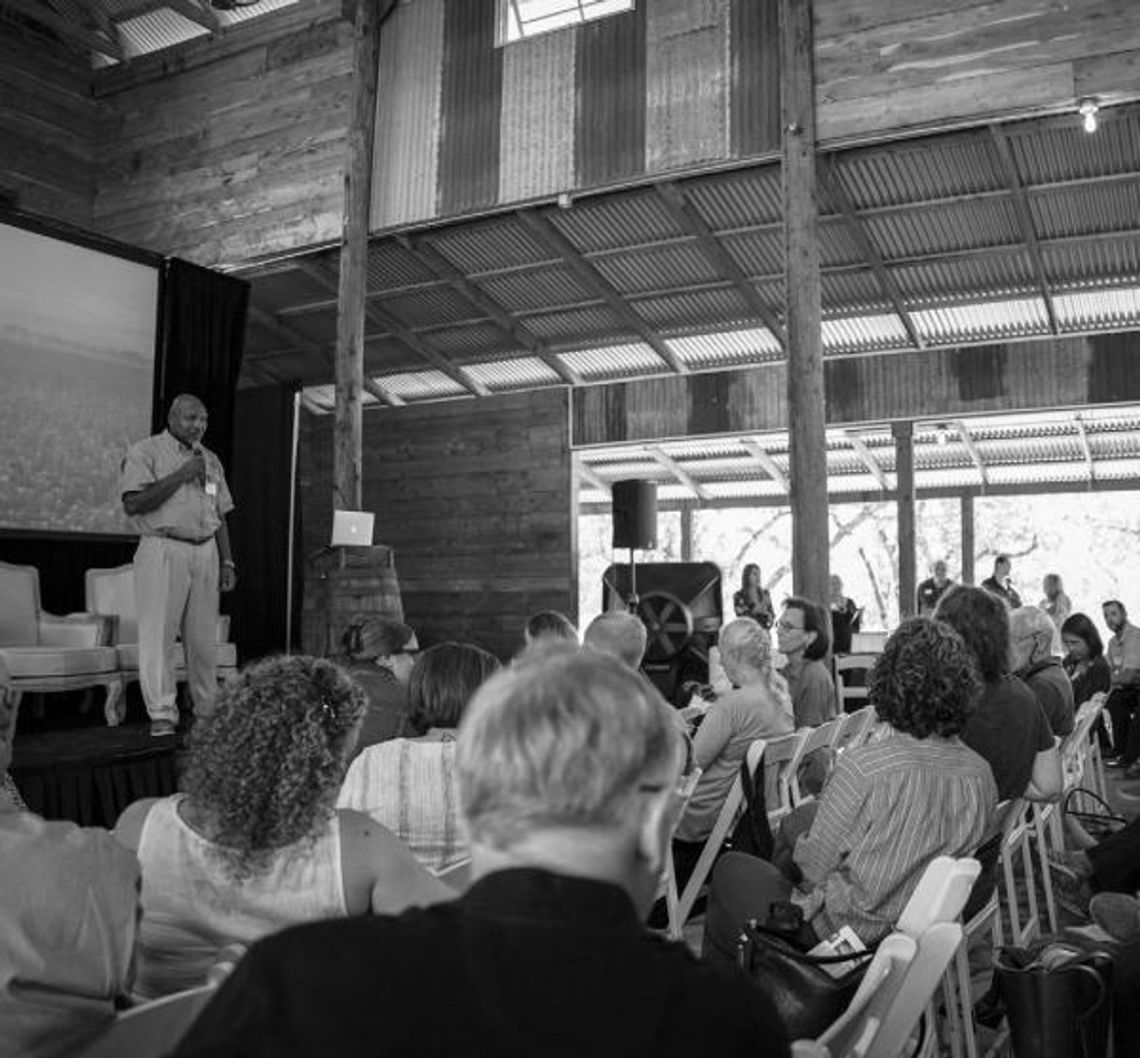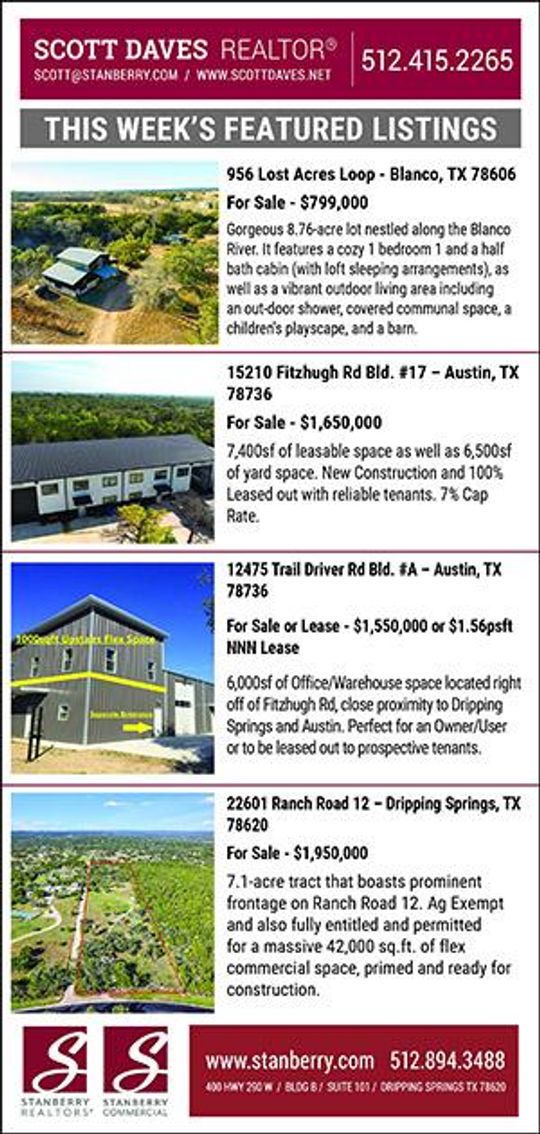Last month, conservation leaders from across the Texas Hill Country met at The Hall at Jester King Brewery for the Hill Country Alliance’s annual Leadership Summit.
The event brought together more than 250 attendees on Thursday, Sept. 29 — both online and in-person — to learn about conservation strategies, discuss complex natural resource challenges and solutions and connect with community leaders across the Hill Country. Attendees ranged from college students to professionals across the conservation, development and county government spaces.
Morning sessions began with a panel on storytelling, featuring Juan Martinez-Pineda from The Aspen Institute, Maria Rocha from the Indigenous Cultures Institute, Katy Baldock from Fin & Fur Films and Vanessa Torres from The National Parks Service. The panel discussed the variety of perspectives each person brings to conservation, ways to engage new and changing audiences in the outdoors and the intrinsic ties between the natural world and culture.
Rocha, an elder of the Miakan-Garza Band of the Coahuiltecan people, spoke to this connection.
“According to archaeologists, our story goes back at least 14,000 years, but according to our people, it goes back to the very beginning.” Rocha shared. “We are all living on sacred lands - this Hill Country, the springs, all throughout Texas… we’re all now the stewards of that ancient story.”
Rocha continued on to explain “Napako,” the Coahuiltecan creation story, as well as the indigenous history behind the four great springs of Texas.
The opening panel was followed by a presentation from Judge Bella Rubio of Real County, who raised several issues impacting the western, lesspopulated, Hill Country counties.
“We have so much to offer, and we need to protect what we have,” she said. Rubio also highlighted issues surrounding telecommunications, local business development, tourism and rivers running low during the drought.
Keynote speaker David Buggs, chief diversity and inclusion officer for the Texas Parks and Wildlife Department, spoke on “Different Shades of Green,” highlighting the needs to engage diverse audiences and to actively foster a sense of belonging in state parks, environmental work and conservation as a whole amid changing state demographics.
“Don’t do anything for me without me,” Buggs stressed, explaining how crucial it is to seek out new partners from historically excluded communities. “We need to share the bounty of this land as well as the responsibility of its stewardship.”
Carolyn Chipman Evans, CEO of the Cibolo Center for Conservation, and David Baker, founder and executive director of the Watershed Association and Art4Water, were honored with the Heart of the Hill Country Award to recognize and celebrate their work championing and stewarding the natural resources of the region. Chipman Evans and Baker have both spent decades working within their communities to preserve the Hill Country’s unique resources and to educate and inspire others to do the same.
Afternoon sessions included a presentation on emerging research from Angelica Lopez, Ph.D., a research scientist with Texas A&M University’s Natural Resource Institute. Lopez presented the institute’s recent research into water equity in the Hill Country, noting that the Natural Resource Institute created a data visualization tool (available on their website) which can be used to analyze land development, access to water and area demographics. In-person surveys involved in the research allowed researchers to hear the voices of people impacted by different forms of water inequity — in particular, flooding, water quality issues and a lack of access to safe drinking water, she added.
A panel on spring flows highlighted the state of springs in the Hill Country and steps communities can take to keep their springs flowing as demand on regional aquifers continues to rise. This panel was moderated by Vanessa Puig-Williams of the Environmental Defense Fund (and current chair of the Hill Country Alliance Board of Directors) and featured Dr. Robert Mace, executive director of The Meadows Center for Water and the Environment, and Mitchell Sodek, general manager of the Central Texas Groundwater Conservation District. The panelists emphasized the importance of engaging with local Groundwater Conservation Districts and continuing to develop the science to better understand groundwater- surface water interactions.
A series of lightinground talks preceded the final panel of the day: a conversation with regional elected officials, moderated by Hill Country Alliance Board member David Yeates. State Representative Erin Zwiener (Hays and Blanco Counties), Kendall County Commissioner Don Durden and Kimble County Judge-Elect Hal Rose discussed their views on issues that span the Hill Country, focusing on growth, its challenges and the tools available for community planning. As Rose stated, “It starts at a local level… No elected official is ever going to agree with you on everything, but if you don’t make your voice heard, they’ll never start.”
Jester King Brewery served as the 2022 Summit’s signature sponsor and host. The full event was recorded and streamed live to online attendees across the Hill Country and beyond, thanks to the sponsorship of the Cynthia and George Mitchell Foundation. The first panel on storytelling is recorded and publicly available at https://bit.ly/HCAStorytelling22. Additional recordings will be shared through the Hill Country Alliance YouTube Channel and website at hillcountryalliance. org.
.png)









